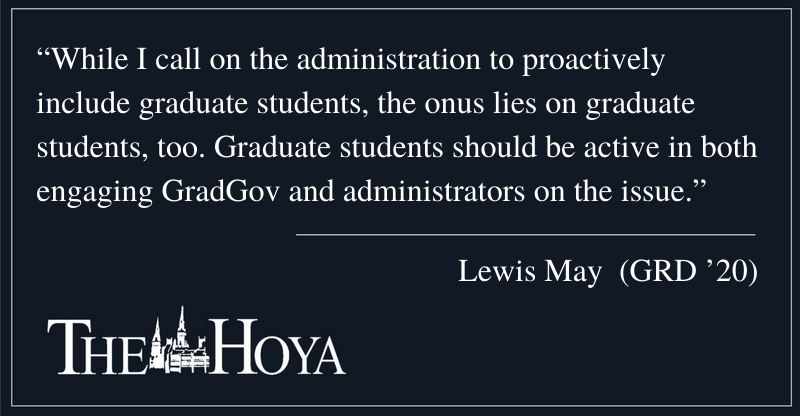Graduate Students Need Seat at the Table for Discussions Around Slavery, Memory and Reconciliation.
Prior to applying to Georgetown University in 2018, one of my first experiences with the university was reading about the Slavery, Memory, and Reconciliation project in The New York Times. While I was troubled by Georgetown’s legacy of profiting from slavery, I was heartened by both the initiative of the student activists and the administration’s attempts to reckon with a difficult past. Now, as a second-year Master of Science in Foreign Service student and president of the Georgetown University Graduate Student Government, I feel a special obligation to engage with the project that formed my initial impressions of Georgetown.
In particular, the graduate student community needs to assume a greater role and responsibility in the ongoing SMR project. Georgetown graduate students are the largest student population and possess an incredible diversity of experience. We have a significant stake in the moral integrity and public image of Georgetown in which this initiative plays a key role. Consequently, we must have a seat at the table. The administration needs to push for graduate student involvement in the initiative and ensure that graduate students are placed on the SMR project’s advisory groups.
University President John J. DeGioia’s (CAS ’79, GRD ’95) recent letter pledging that the university will provide financial support and set a timeline for the SMR project’s implementation is a promising initial step. I urge DeGioia and the administration to follow through on their commitment to implement the SMR project in a manner that effectively offers some redress for slavery. I also commend the descendants and undergraduate activists for taking the lead on pushing these initiatives forward. Without their tenacity and commitment, we would not be having these essential conversations today.
However, Georgetown has not historically addressed graduate student concerns on the issue. In my time as GradGov president, numerous graduate students have expressed frustration that they were unaware of how to become involved in the SMR project. Other graduate students have expressed concern that they only learned about last year’s GU272 referendum or prior SMR projects from outside news sources after the projects had already been implemented. The referendum sought to implement a mandatory semesterly fee of $27.20 for undergraduates to create a fund to benefit the descendants of the 272 enslaved people sold by the Maryland Province of the Society of Jesus in 1838 to financially sustain the university.
While many graduate students have been supportive of the efforts, others have also offered valuable and insightful critiques of the SMR project that I believe should be incorporated as part of the broader discussion on how to best pursue reconciliation as a university. These diverse voices of graduate students need to be better incorporated into the upcoming projects that are part of the SMR initiative.
As the largest population of Georgetown students, graduate students have a significant stake in the SMR initiative. Much like how the SMR initiative formed my initial impressions of Georgetown, it will also affect graduate students’ broader reputation and integrity as members of the Georgetown community. Moreover, as the SMR initiative looks to develop projects in health and education for descendant communities, the Georgetown administration must leverage the professional acumen of graduate students specializing in public health, education and other related fields.
GradGov stands ready to assist in doing so. We have assembled a student advocacy committee around the SMR project. We have a body of senators who are committed to representing their constituents’ interests. As the SMR project moves forward, I will continue to engage with administrators about how best to collaborate and ensure that Georgetown graduate students are actively involved in the committees and working groups that guide the SMR project’s implementation.
While I call on the administration to proactively include graduate students, the onus lies on graduate students, too. Graduate students should be active in both engaging GradGov and administrators on the issue. If you are interested in engaging the university on these topics, I recommend reaching out to myself or GradGov.
Whether supportive or critical of the SMR projects, it is imperative that graduate students are vocal and leverage their experience in service of the Georgetown community. While this is a challenging issue, it strikes to the core of Georgetown’s identity and integrity. With so much to offer and so much at stake, Georgetown graduate students can not afford to sit on the sidelines.
Lewis May is a graduate student in the School of Foreign Service.









